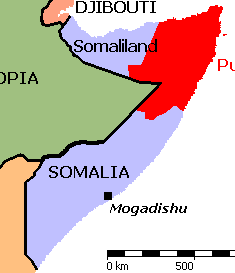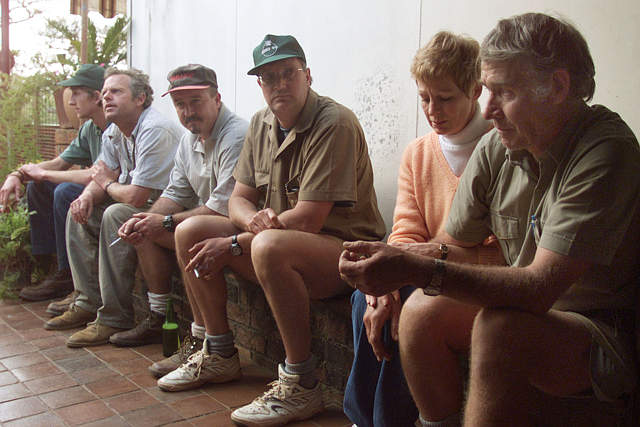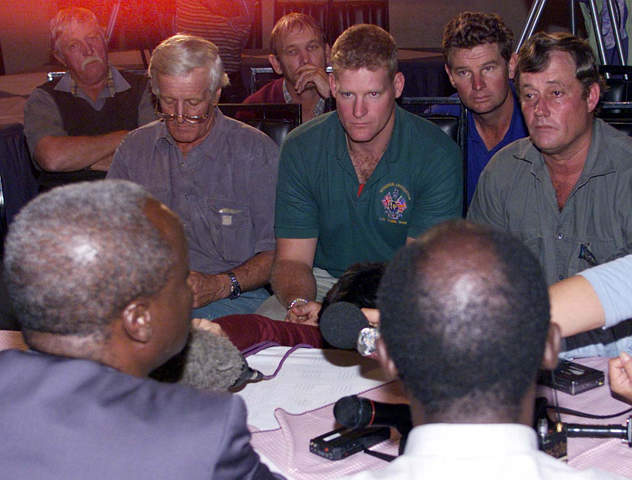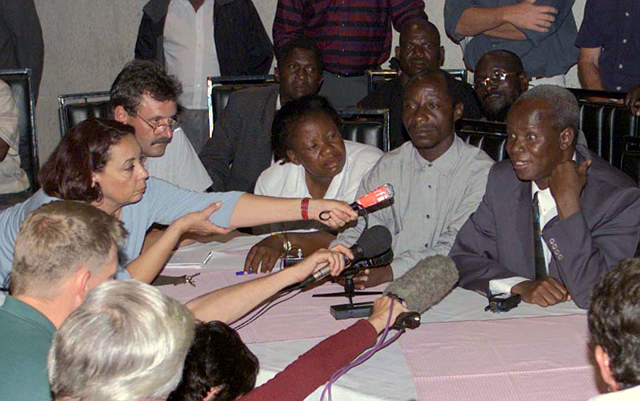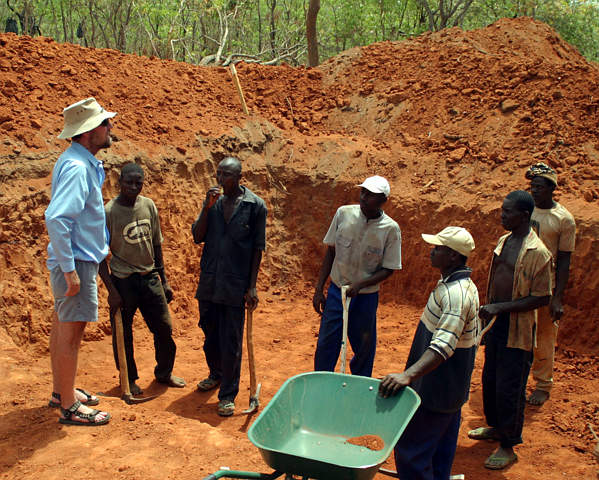|
Zimbabwean Farmers in Somaliland ! |
|
SOMALILAND EMBRACES EVICTED ZIM FARMERS
Somaliland President, Dahir Rayaale
Zimbabwean President Robert Mugabe gives the clenched fist salute while speaking at a Zimbabwean Farmers Union congress in Bindura, 80 Km's north of Harare August 3, 2000. Mugabe said that he would not bow to international pressure to order war veterans and ruling party supporters off occupied mainly white owned farms.
Jenny (L) and Ben (R) Norton walk away from the farm house they built over 40 years ago, on August 8, 2002. They have to leave their farm by midnight on Thursday in order to comply with new laws gazetted by the Zimbabwe government. Robert Mugabe's Government has ordered almost 3,000 white farmers to vacate their farms in order to make way for landless peasants. REUTERS/Paul Cadenhead
A group of war veterans and settlers watch as farm labourers load Ben and Jenny Norton's household goods onto a truck August 8, 2002. Thousands of white Zimbabwean farmers face a midnight deadline on Thursday to leave land they have farmed for generations or risk jail, although a last-minute High Court ruling could provide a grace period. REUTERS/Paul Cadenhead
Somaliland Embraces Evicted Zim Farmers
by Augustine Mukaro January 12, 2007
Jan 12, 2007 (Zimbabwe Independent/All Africa Global Media via COMTEX) -- THE scramble for dispossessed Zimbabwean farmers intensifies in Africa with Somaliland becoming the latest country to offer land to evicted farmers looking for a new start.
More than 20 African countries are scrambling to snap up Zimbabwe's commercial farmers displaced from their properties by the chaotic and often violent land seizures in their bid to develop commercial agriculture.
Somaliland, a former British colony, broke away from Somalia over 10 years ago.
"There are many projects waiting to be developed, to restock our wildlife, open up commercial farming and rebuild the forest," Duale said. "I know we are not one of the glamour destinations, but we do have a sound democracy and total commitment to a new age of commercial farming. I hope some farmers and conservationists will come and have a look at our little country.
"We are a sovereign state with a great future. Our government and people would be honoured to see new immigrants from southern Africa coming to build our farm sector," he said.
Commercial Farmers Union (CFU) spokesperson Emily Crooks said although there wasn't an official approach from the Somaliland government, a number of overtures had been undertaken and farmers would readily accept any offers enabling them to restart their businesses.
"As farmers we are very excited about the recognition of their skills by other Africans states," Crooks said. "We would take any opportunities that would allow our members to go back into faming."
Officials at CFU said the success of the farmers' venture in Nigeria had generated intense interest from African governments keen to develop commercial agriculture.
"The Nigerian project has opened many doors, and will continue to open more doors in other surrounding countries with private companies and government departments approaching us, wanting to put together similar projects," an official with the CFU division of Farmers In Touch said. "Countries that have contacted us include Ghana, Cameroon, Sudan, Guinea Bissau, Benin, Central African Republic and Namibia."
The official said a team was working on getting a project similar to the one in Nigeria together in Senegal.
"Three trips have been made to Senegal and proposals are being put together. All parties involved are positive about this venture," he said. Fifteen farmers and their families have already relocated to Kwara State in Nigeria.
© 2007 AllAfrica, All Rights Reserved
Nigerian state to welcome more Zimbabwean white farmers
JOA September 06, 2006
LAGOS, Sept 6, 2006 (AFP) - The Nigerian state of Kwara is to invite more Zimbabwean white farmers to come and farm its land, boosting an existing agricultural programme, the News Agency of Nigeria (NAN) reported Wednesday.
The state said it would welcome more farmers for the programme, in which 13 white farmers began farming some 1,500 hectares (3,700 acres) of land under a deal with the Kwara government in 2004.
The first group of farmers began work at Shonga, 110 kilometres (68 miles) north of Ilorin, the state capital in the east of the country, and harvested their first crops of maize and soya beans this year.
State Agriculture Commissioner Saka Onimago was quoted as saying that the activities of the white farmers had brought a lot of economic development to the state.
The idea of bringing in Zimbabwean farmers is attracting strong interest in the state, he said.
"The project is becoming more interesting as it has changed the perception of most traditional farmers about mechanised farming," he added.
He added that the commercial farmers were being wooed by other states in Nigeria because of their skills and expertise in mechanised farming.
He said plans were also under way to acquire 20,000 hectares of farmland in another area of the state to boost food and agricultural production.
The Zimbabweans came to Nigeria following a controversial land reform policy of their southern African country's President Robert Mugabe, which seized prime land owned by the white farmers and redistributed it to poor black people.
© Copyright Agence France-Presse, 2006 All reproduction and presentation rights reserved.
Of White Farmers And the Sierra Leone Exploit
by Saidu Kaye Sesay March 10, 2006
London, Mar 10, 2006 (The Independent/All Africa Global Media via COMTEX) -- I have read with great concern efforts by Ombudsman Francis Gabbidon to pave the way for Zimbabwean White farmers now resident in Kwara State, Nigeria, to settle in Sierra Leone with the promise to export their mechanized farming skills which they noted will benefit Sierra Leone 'immensely in the acquisition of food sufficiency within a short period of time'.
How sweet that sound to the ears of the ever-hungry populace of our country. I do not wish to look at the intention with any suspicion, but rather to share my fears and concern, with regards inviting some controversial aliens to settle in Sierra Leone in what would inevitably be in large numbers. In as much as we live in a global village where cooperation is a virtue, we must as a nation thread cautiously, lest we undermine the very foundation of an African Union, thus playing into the hands of sworn enemies of the South-south cooperation.
Excuse me; I would be digressing a bit, meaningfully though, as I seek to recapture an historical drama Dispossession History I am not immediately suggesting that Robert Mugabe was right in stripping White farmers in Zimbabwe of their rights of land possession, but we must as a nation seek to study the factors that culminated to his actions, and if possible, digest what lessons we can learn from that. The history of White farmers in Zimbabwe and South Africa, to name few countries does not make an encouraging reading. An article, A Land Dispossession History, based on the South African experience note "By the 1860s, subjugation of African people in the immediate vicinity of the Cape had been achieved. Other than a small enfranchised minority who owned land, the majority of Africans living here had been proletarianised, and were reduced to the status of labour. This labour was kept subservient through legislation and force, or the threat of such'.
Right an ancient wrong I am willing to concede to the argument that those were colonialism days when natives had no say in legislations, if only I would be assured that the peoples representatives in our present parliament, would not for a fee turn a blind eye if these nomads are allowed to settle in our land, and decide to subjugate our less fortunate compatriots. It is note worthy that such bestial behavior became commonplace wherever these White settlers farmed: From South Africa to Zimbabwe unto Kenya, their serfs (the African Labourers) were over worked like you would donkeys. Slavery was abolished, but not with the blessing of some sadists. The insatiable thirst of some White settlers to lord over cheap Labour by all cost became evident in the Zimbabwe saga. All what Mugabe wanted, according to the man himself was to right an ancient wrong by returning land, expropriated by white settlers to its rightful black owners. To my mind, I see nothing wrong with it, if only Mugabe had done it in a more civilized fashion. But even that; i.e. what is accepted civilized behavior is open to debate, because as far as the white settlers are concerned Zimbabwe is their ancestral land and therefore, no one has the right to remove them from those lands. But it was a bold and critical decision Mugabe had to make, where Mandela didn't dare. I am sure that silently the front line states supported his decision, but hypocritically succumbing to diplomacy and world opinion, shunned him. That is the way the West want it, to divide and rule Africa, even in an era when unity is what we need most as a continent.
In an article, Zimbabwe's Mugabe and White Farmers, Dr. A. Chika Onyeani, of The African Sun Times, wrote "It seems the height of hypocrisy that the world should be focussed on the plight and non-payment of compensation to white farmers, without as much as a mention a of the savagery with which the Black African owners were massacred and their lands seized without compensation." My research indicates that the word Bulawayo, which is the second largest city in Zimbabwe, is an Ndebele word, meaning slaughter, apparently referring to the savagery of the British settlers, including the infamous Cecil Rhodes who had crushed the attempt by the indigenes to fight back, leading King Lobengula to swallow poison rather than be captured. Are there lessons in this?
The following statistics should wake us all to the reality of the mental torture Black Zimbabweans were going through. Zimbabwe, with a population of about 11 million people, had more than 60% of its arable land controlled by the whites who make up less than 2% of the population. Are there not lessons in this?
Back to the Sierra Leone scene. We seem to forget so soon the unpleasant tales of our history. And as usual, it is always one man that brings to bear woes upon a population of about 4.5million always one man; some one who wines and dines along the corridors of power; let it not be you Gabby. Let's traverse memory lane: Remember Shabtai Kalmanovich of the Liat criminality and Nir Gouaz of the NR Scipa rip off in the APC days? But the most shameful and detestable of all was the NPRC introduced Executive Outcomes, who exploited poverty stricken ladies of Waterloo; an incident that was dubbed BAFANA BAFANA. Those guys did not only exploit the chastity of our female compatriots, they photographed their sexual activities, in the most humiliating postures against a background of forests and streams, and then distributed these at the Waterloo lorry park as a farewell to a genuine people who showed them love. Now, if Gabbidon's campaign succeeds, the White Zimbabweans would settle in the interiors, right? With paedophiles on the loose, only history would give a recount of more sordid activities. Don't tell me they would be prosecuted. Who ever prosecuted Italians attached to SALCOST at Bumbuna, who paid our sisters to allow their dogs to romp them?
I have the 'privilege' of living in the UK and the 'luxury' of shopping at Shepherd's Bush Market. I have come across White Zimbabwean farmers who have settled in butchery and grocery businesses. Most owe their new found lives to compensations. If these examples could resettle in their original homes, why not those, who have decided to become nomads. The answers could be found in the possibility that some are afraid of their criminal pasts. Britain as a civilized country is ready to offer them support, but not when (note, even if it takes centuries) they would have criminal questions to answer. So, most of them like the perpetrators of the holocaust, are still lurking in the continent. Some maybe are in search of cheap labors, which is hard to come by in UK. Some know what it means to evade taxes in the UK. Some are genuinely searching for the sun so be it.
Let me make myself clear. I am not against investors coming to Sierra Leone. But should we allow them, I would advice that proper screenings, more so for paedophiles, be done to weed out criminals.
© 2006 AllAfrica, All Rights Reserved
Zimbabwean farmers Duncan Parkes (R-L) his wife Isla, Hamish Turner, Rob Fergus, Selby Black and Stuart Parkes talk to journalists after they were released by war veterans on their farm Mayfields 20 Km's north of Harare August 3, 2000. The Parkes and seventeen other neighboring farmers were held hostage overnight and were only allowed to leave after negotiations with senior war veterans and the police.
Chairman of the Zimbabean War Veterans Association Chenjerai 'Hitler' Hunzvi speaks to white Zimbabwean farmers at a meeting in Marondera April 20. Hunzi said after the meeting that farm occupations would continue, but called for a "cessation of hostilities" in the struggle for control of the country's white-owned farms.
Chairman of the Zimbabean War Veterans Association Chenjerai 'Hitler' Hunzvi (L) speaks to white Zimbabwean farmers at a meeting and members of the media in Marondera April 20. Hunzi said after the meeting that farm occupations would continue, but called for a "cessation of hostilities" in the struggle for control of the country's white-owned farms.
White Zimbabwean farmer Allan Jack discuss with local workers near a new construction site March 26, 2005 alongside the River Niger near the town of Shonga in Kwara State, Nigeria. The local governor has allocated some 16,000 hectares on a 25-year lease to 15 Zimbabwean farmers who were kicked off their land back home and now are carving out a new future - mapping out fields, building houses and drilling boreholes. Picture taken on March 26, 2005. REUTERS/George Esiri
|
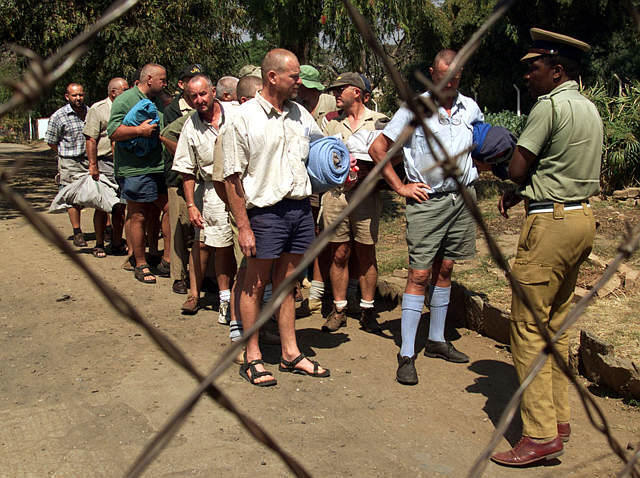
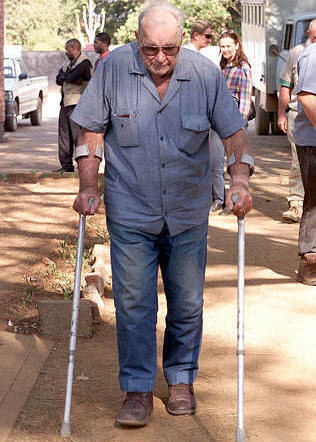

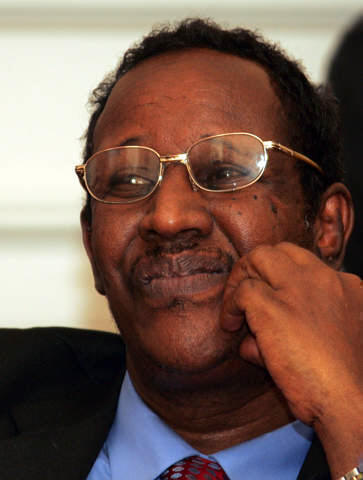
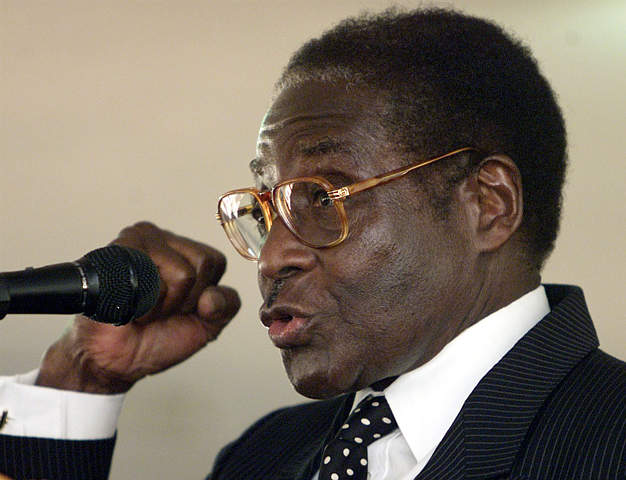
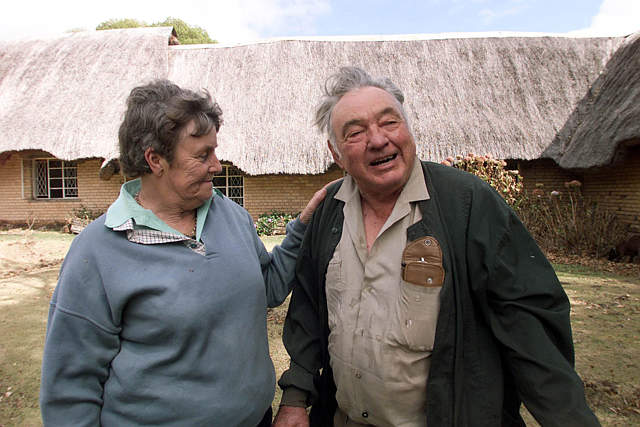
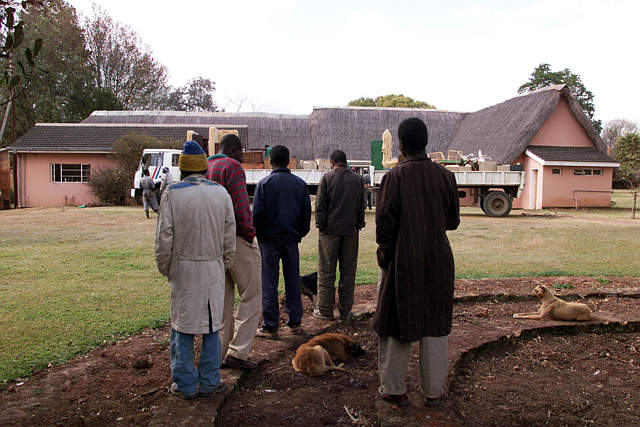
 Foreign
minister Abdulali Duale
Foreign
minister Abdulali Duale